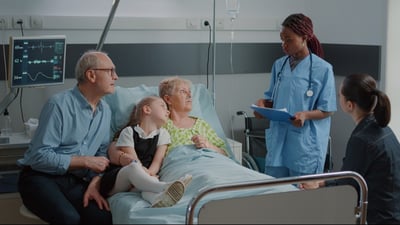Categories Palliative Care



Relevance: Medium-High
Most relevant for: Cancer patients
Topic: Experts call for early palliative care for cancer patients
People with cancer need support and care not only at the end of life but from the time of diagnosis. At the 2024 American Society of Clinical Oncology (ASCO) annual meeting, the organization’s president urged cancer healthcare professionals to make palliative care central to cancer treatment. (Posted 7/17/24)
Este artículo está disponible en español.
READ MORE ›


Relevance: High
Most relevant for: People with advanced ovarian cancer
Study: What influences aggressive end-of-life care for ovarian cancer?
Aggressive medical treatment is often given to people with terminal ovarian cancer when prior treatment has stopped working. This aggressive end-of-life treatment conflicts with clinical guidelines, may increase pain and suffering and does not extend life. This study found that the end-of-life care that a person with ovarian cancer receives is influenced by their doctors. (Posted 1/3/23)
Este artículo está disponible en español.
READ MORE ›


Relevance: High
Most relevant for: People with pancreatic cancer who are dealing with related pain.
Update: Strategies for managing pancreatic cancer pain
Abdominal pain is often a severe, ongoing symptom of pancreatic cancer, yet little research has been done on how to best reduce this pain. The authors of this review discuss current strategies for managing cancer-related pain and their effectiveness. (Posted 10/31/22)
Este artículo está disponible en español.
READ MORE ›


Relevance: High
Most relevant for: People considering acupuncture for managing breast cancer treatment symptoms.
Study: Acupuncture may ease breast cancer treatment side effects
Acupuncture can ease some symptoms of breast cancer treatment. Multiple studies found that acupuncture is a safe and effective strategy to manage certain symptoms but also called for more rigorous research on the topic. (Posted 9/28/22) Este artículo está disponible en español.
READ MORE ›


Relevance: Medium-High
Most relevant for: People interested in using cannabis to relieve treatment side effects.
Study: Cannabis use among breast cancer patients
This study looked at patterns of cannabis use among breast cancer patients who are members of online health communities. Almost half of the study participants reported using cannabis to help manage treatment symptoms and side effects. The study also looked at reasons why patients used cannabis, where they obtained it and whether they perceived cannabis to be safe. While this study only looked at cannabis use among breast cancer patients it is likely results would be similar among patients diagnosed with other types of cancers. (posted 1/25/22)
Este artículo está disponible en español.
READ MORE ›


Relevance: Medium-High
Most relevant for: People with pancreatic cancer
Article: Overview of pancreatic cancer treatment options
This review looks at current strategies for pancreatic cancer care and potential future therapies. (posted 7/28/21)
Este artículo está disponible en español.
READ MORE ›


Relevance: High
Most relevant for: People diagnosed with metastatic breast cancer
Personal Story: Improving the quality of life for people with metastatic breast cancer
A Washington Post article described the cancer experience of a young woman living with metastatic breast cancer. It also highlights how integrative medicine and palliative care, including acupuncture, massage, yoga, pain management, mental health therapy and nutrition can improve quality of life for people with metastatic cancer. (3/10/20)
Este artículo está disponible en español.
READ MORE ›


Relevance: High
Most relevant for: People diagnosed with metastatic breast cancer
Study: Supportive care can improve quality of life for people with metastatic breast cancer
Metastatic breast cancer patients have unique needs for treatment and care. Connecting patients to appropriate support services and palliative care is an area of need in health care. A recent study reported improvement in metastatic breast cancer patient quality of life and wellness with an intervention program called the Supportive, Education and Advocacy (MBC-SEA) program. (8/21/19)
READ MORE ›